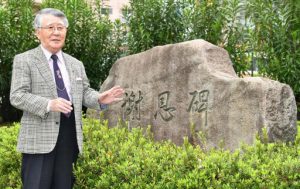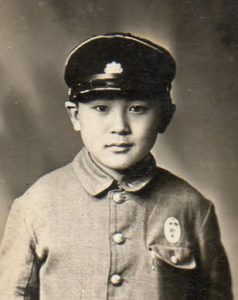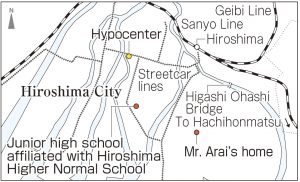Survivors’ Stories: Shunichiro Arai, 87, Hiroshima: Children’s deaths must not be in vain
Jun. 11, 2019
by Kyoko Niiyama, Staff Writer
“I survived, though many of my friends died.” Shunichiro Arai, 87, always begins with these words when he shares his A-bomb account with children. His classmates at the junior high school affiliated with the Hiroshima Higher Normal School (now the junior high school affiliated with Hiroshima University), as well as many of his friends who had studied with him at a national school until four months before the atomic bombing, lost their lives to the atomic bomb. His friend’s mother said to him, “My child was killed, but…” and this led to Mr. Arai feeling guilty over having survived.
In late July 1945, Mr. Arai, who was 13 years old and a first-year student in junior high school, was evacuated to Kamo-gun (now part of Higashihiroshima City) along with about 80 schoolmates in the event that Hiroshima became a target of air raids. The evacuees lived at temples or shrines and were mobilized to help with agricultural work by weeding rice fields, with the aim of increasing food production.
On the morning of August 6, Mr. Arai and four classmates were allowed to return home for a little while and they headed for downtown Hiroshima. When they were waiting for a train on the platform at Hachihonmatsu Station, on the Sanyo Line, Mr. Arai suddenly saw a white flash of light in the sky then felt a tremendous jolt, as if he had been struck by a club. He collapsed and when he opened his eyes again, he saw a huge cloud billowing up into the sky.
Not knowing what had happened, they got on the train which arrived at the station, but the train stopped operating at the next stop, Senogawa Station. They had to continue on to the city center on foot.
When they came to Akinakano Station (now in Aki Ward), the horrific scenes Mr. Arai saw left him speechless. There were groups of red-colored figures moving toward them. These were people walking with their arms stretched out in front of them and their burnt skin hanging off their bones, drooping down from their fingertips. They looked like hunks of burned flesh.
Mr. Arai passed by young sisters on the Higashi Ohashi Bridge (now in Minami Ward). Their faces were swollen like balloons and their eyes and mouths were sunken in. The older sister, who was holding her younger sister’s hand, encouraged her in a faint voice, telling her “Hold on.” Mr. Arai is unable to forget those two sisters.
In the late afternoon of that day, when Mr. Arai reached his home in Deshio-cho (now part of Minami Ward), his parents were sitting, at a loss, in front of the wreckage of their house. They were covered in blood but, miraculously, had survived.
The next day, Mr. Arai visited the junior high school affiliated with the Hiroshima Higher Normal School, located in Higashisenda-machi (now part of Naka Ward), to submit the report which had been entrusted to him by his teacher when he left his evacuation site. The school, which was about 1.3 kilometers from the hypocenter, had disappeared without a trace. When he returned home after carrying out his duty, he fell ill with a high fever and nausea, and became bedridden.
The words “My child was killed, but…,” which were said to him after the atomic bombing, felt like a stab in the chest. Mr. Arai went on to graduate from Hiroshima University and got a job at Radio Chugoku (now RCC Broadcasting Company). He produced a radio drama on the theme of A-bomb orphans, but he did not talk about his own experience, not even to his family.
Mr. Arai was past 50 when he began to feel that he should talk about the atomic bombing so that the deaths of children who were the same age as he was would not have been in vain. In 1981, working together with classmates from the junior high school affiliated with the Hiroshima Higher Normal School, he erected a monument to mourn for the dead on the grounds of the junior high school affiliated with Hiroshima University, located in Minami Ward, and produced books that describe A-bomb experiences and people’s lives during the war.
While Mr. Arai escaped being directly exposed to the atomic bomb, he nevertheless developed four cases of cancer, including cancer of the prostate gland and kidney, and experienced terrible struggles against his illnesses. It is said that such cancers are not borne of metastasis but occur in a different organ each time, which is common to A-bomb survivors. He keenly feels the cruelty of the atomic bomb as the radiation it released remains a lifelong health hazard to A-bomb survivors like himself who were exposed to residual radiation after entering the city center in the aftermath of the attack.
Mr. Arai has served as an A-bomb witness with the City of Hiroshima since 2010, speaking about his experience while taking time off during times of illness. He is also involved in training “memory keepers” to inherit and hand down the survivors’ testimonies. He said, “I have a responsibility to convey what I saw on that day to the next generation.” He is determined to continue sharing his account as long as his strength holds out.
Teenagers’ Impressions
I should do everything I can for peace
Mr. Arai experienced the atomic bombing and has endured many hardships while feeling guilty over the fact that he survived. Still, he has continued to call for peace. When I listened to his account, I felt that I should do everything I can for peace. It’s not at all enough to just say, “I don’t know,” and it’s important to learn about these things for myself. As a junior writer, I want to listen to the thoughts about peace of the A-bomb survivors and those who lost family members because of the atomic bombing, as well as gather information about A-bombed buildings and trees. I then want to tell others about these things. (Shino Taguchi, 13)
Talking to my family about what I heard
Mr. Arai told us about his experience and said, “As someone who survived the atomic bombing, it’s my mission to speak out.” He agonized over the fact that he survived the bombing while children of the same age lost their lives. I learned that both people who lost family members and A-bomb survivors who are alive today have feelings of anguish. I want to do what I can to hand down A-bomb experiences, which includes talking to my family about what I heard. (Chihiro Yamase, 12)
(Originally published on June 11, 2019)
“I survived, though many of my friends died.” Shunichiro Arai, 87, always begins with these words when he shares his A-bomb account with children. His classmates at the junior high school affiliated with the Hiroshima Higher Normal School (now the junior high school affiliated with Hiroshima University), as well as many of his friends who had studied with him at a national school until four months before the atomic bombing, lost their lives to the atomic bomb. His friend’s mother said to him, “My child was killed, but…” and this led to Mr. Arai feeling guilty over having survived.
In late July 1945, Mr. Arai, who was 13 years old and a first-year student in junior high school, was evacuated to Kamo-gun (now part of Higashihiroshima City) along with about 80 schoolmates in the event that Hiroshima became a target of air raids. The evacuees lived at temples or shrines and were mobilized to help with agricultural work by weeding rice fields, with the aim of increasing food production.
On the morning of August 6, Mr. Arai and four classmates were allowed to return home for a little while and they headed for downtown Hiroshima. When they were waiting for a train on the platform at Hachihonmatsu Station, on the Sanyo Line, Mr. Arai suddenly saw a white flash of light in the sky then felt a tremendous jolt, as if he had been struck by a club. He collapsed and when he opened his eyes again, he saw a huge cloud billowing up into the sky.
Not knowing what had happened, they got on the train which arrived at the station, but the train stopped operating at the next stop, Senogawa Station. They had to continue on to the city center on foot.
When they came to Akinakano Station (now in Aki Ward), the horrific scenes Mr. Arai saw left him speechless. There were groups of red-colored figures moving toward them. These were people walking with their arms stretched out in front of them and their burnt skin hanging off their bones, drooping down from their fingertips. They looked like hunks of burned flesh.
Mr. Arai passed by young sisters on the Higashi Ohashi Bridge (now in Minami Ward). Their faces were swollen like balloons and their eyes and mouths were sunken in. The older sister, who was holding her younger sister’s hand, encouraged her in a faint voice, telling her “Hold on.” Mr. Arai is unable to forget those two sisters.
In the late afternoon of that day, when Mr. Arai reached his home in Deshio-cho (now part of Minami Ward), his parents were sitting, at a loss, in front of the wreckage of their house. They were covered in blood but, miraculously, had survived.
The next day, Mr. Arai visited the junior high school affiliated with the Hiroshima Higher Normal School, located in Higashisenda-machi (now part of Naka Ward), to submit the report which had been entrusted to him by his teacher when he left his evacuation site. The school, which was about 1.3 kilometers from the hypocenter, had disappeared without a trace. When he returned home after carrying out his duty, he fell ill with a high fever and nausea, and became bedridden.
The words “My child was killed, but…,” which were said to him after the atomic bombing, felt like a stab in the chest. Mr. Arai went on to graduate from Hiroshima University and got a job at Radio Chugoku (now RCC Broadcasting Company). He produced a radio drama on the theme of A-bomb orphans, but he did not talk about his own experience, not even to his family.
Mr. Arai was past 50 when he began to feel that he should talk about the atomic bombing so that the deaths of children who were the same age as he was would not have been in vain. In 1981, working together with classmates from the junior high school affiliated with the Hiroshima Higher Normal School, he erected a monument to mourn for the dead on the grounds of the junior high school affiliated with Hiroshima University, located in Minami Ward, and produced books that describe A-bomb experiences and people’s lives during the war.
While Mr. Arai escaped being directly exposed to the atomic bomb, he nevertheless developed four cases of cancer, including cancer of the prostate gland and kidney, and experienced terrible struggles against his illnesses. It is said that such cancers are not borne of metastasis but occur in a different organ each time, which is common to A-bomb survivors. He keenly feels the cruelty of the atomic bomb as the radiation it released remains a lifelong health hazard to A-bomb survivors like himself who were exposed to residual radiation after entering the city center in the aftermath of the attack.
Mr. Arai has served as an A-bomb witness with the City of Hiroshima since 2010, speaking about his experience while taking time off during times of illness. He is also involved in training “memory keepers” to inherit and hand down the survivors’ testimonies. He said, “I have a responsibility to convey what I saw on that day to the next generation.” He is determined to continue sharing his account as long as his strength holds out.
Teenagers’ Impressions
I should do everything I can for peace
Mr. Arai experienced the atomic bombing and has endured many hardships while feeling guilty over the fact that he survived. Still, he has continued to call for peace. When I listened to his account, I felt that I should do everything I can for peace. It’s not at all enough to just say, “I don’t know,” and it’s important to learn about these things for myself. As a junior writer, I want to listen to the thoughts about peace of the A-bomb survivors and those who lost family members because of the atomic bombing, as well as gather information about A-bombed buildings and trees. I then want to tell others about these things. (Shino Taguchi, 13)
Talking to my family about what I heard
Mr. Arai told us about his experience and said, “As someone who survived the atomic bombing, it’s my mission to speak out.” He agonized over the fact that he survived the bombing while children of the same age lost their lives. I learned that both people who lost family members and A-bomb survivors who are alive today have feelings of anguish. I want to do what I can to hand down A-bomb experiences, which includes talking to my family about what I heard. (Chihiro Yamase, 12)
(Originally published on June 11, 2019)










